- Home
- Cary Fagan
The Old World and Other Stories Page 7
The Old World and Other Stories Read online
Page 7
“You don’t say. Next time I’m in Paris I’ll look out for them.”
“They just call them that, any restaurant or diner can use them. Actually, I made a delivery of six of them here, reason why I’m in the neighbourhood. We sell wholesale to furniture stores, too, although once in a while an individual comes into the workshop.”
“Workshop, huh? Like elves making toys.”
“There’s still a lot of hand work, see. Not that we don’t have table saws, lathes, sanders, what have you. But the final carving, getting the spindles to fit tight. Truth is people don’t realize what an amazing creation a chair is.”
“Me, for instance. Bartender, I’m switching to beer.” I watched him pull it. Behind him were various things thumbtacked to the wall. Postcards, a newspaper article about police raiding a sex club, a sign that said Charity begins at the bar.
“That’s right. People think of certain basic inventions. The wheel. The lever. The printing press. Sure, they’re important, but if you ask me it’s the chair that made civilization. Instead of humans squatting on their haunches, you’ve got them sitting upright, face to face, having a meal, talking, being sociable. You don’t want nations to go to war? Put their leaders in a couple of chairs.”
“That’s just what we should have said in World War Two. ‘Adolf, take a seat.’” I took a long draft of beer. How in the hell was I going to make back that money?
Geppetto here ignored me. “People think a chair is simple but boy are they wrong. It’s not the number of parts. It’s the tension. The stresses. What keeps the whole thing together, the legs from splaying out or collapsing, the back from splitting apart, or the thing just turning over. Every part in proper relationship to the other. I say that underlined. You know what a chair is like? A bridge. Think Golden Gate, think Brooklyn Bridge holding up all those cars and people. You know how much pressure a man like yourself exerts? What are you, a hundred and eighty pounds?”
“Don’t flatter me.”
“And yet if you sat in one of our chairs, which looks almost delicate, you’d find it held you up just fine. And what’s more, you’d be as cozy as anything.”
“Would I?”
“Oh sure, that’s the proportions. The height of the seat, the angle of the back. And then there’s the seat itself. I mean, a wooden seat, how comfortable could that be? But you don’t even need a pillow, the way we carve it. That’s true even though some little old lady might use it right after you. You’d think there has to be a compromise —”
“Naturally.”
“— and yet you don’t feel any, that’s what’s so remarkable. I’ll be honest with you, my friend, in my opinion the chair is one of the noblest of human accomplishments. I don’t care if it’s the throne of a king or a seat in some coal miner’s kitchen.”
“You’re right there, friend,” I said. “Because they’ve all got to hold up somebody’s ass.”
“Well —”
“They’ve got to absorb the odours from that end of the body. What the commoner calls a fart. Throne or kitchen chair, people are always going to release some wind.”
“Yes, very funny, I get it.”
“Blat, blat, blat, puff, puff, puff . . .”
“Now you don’t have to —”
“Bvvvt! That was a real one. And here comes another —”
He cold-cocked me. Caught me right in the jaw. I went down like a sack of bricks. I must have caught one ear on the bar as I went down, because when I came to it throbbed, along with my jaw and the back of my head where I’d hit the floor. I had a wet and dirty rag on my face.
The guy was gone. Ran out like a scared rabbit as soon as he slugged me, the bartender said. He helped me to the nearest table, where I sat down, and he brought over my beer and a bag of ice. I took a sip and felt my jaw move like a rusted trap. And then a thought came to me.
I stood up shakily so that I could see what I was on. Sure enough, it was one of the new chairs the guy had brought in. Still had a shine on the finish. I slumped down again, half sorry he wasn’t here to appreciate the irony. I noticed how well it held me up, how naturally it accepted my large frame. Even the seat was as comfortable as he’d said. Well, well. That asshole was right. A chair really is something.
BAD RUFUS
Everyone said that Rufus was the sweetest man they had ever known. It was partly his demeanour, the slow shuffling walk and the slight tremor in his hands and the softness of his eyes — a gaze of pathos and understanding. His voice was higher than most men’s and he was never known to speak in anger. Really, he didn’t talk much and when he did it was to remark on the weather, always with astonishment, or to ask how your digestion was, a particular interest for him.
As a young man in the army Rufus had been a surgeon. He saw the terrible results of battle. He tried to save lives using the crudest medical surgery — mostly just sewing up or amputating. Asked about it, he would merely get a faraway look. After the war, he wanted nothing to do with medicine. He got a job at the train station as a teller, sitting on a stool behind the counter. He sold tickets to Staynmore and High Creek and Ravinsville. He knew where everyone in town went and when they were coming back. If somebody mentioned, say, Charles Merton, Rufus would say, “Took the ten-o-five to Pike’s Creek with a return on Thursday.” There never seemed to be anything on Rufus’s mind but the weather, the workings of the bowels, and the townsfolk’s train schedules.
He’d gotten married after the war. Margret Stuffhart — Peggy — was the oldest of seven daughters. She was a sturdy, hardworking woman who ran the house, kept a substantial kitchen garden, and raised pigs. But Peggy got some awful disease that made sores all over her body until she was only too glad to die. Rufus, they say, was never the same after that. He forgot to go to his job at the station and when he did show up he gave people the wrong tickets. The station manager finally had to fire him. At home, he let the kitchen garden go to seed. The pigs rooted under the pen and took off; it’s said that their descendants, returned to a wild state, still live in the nearby woods. The chickens stayed around until the foxes got them. Rufus didn’t seem to care about any of it.
It is an unfortunate truth that some seem born into this world only to take advantage of the weakness of others. Word spread that a harmless old man was living in the last house out of town, just waiting to be fleeced. Maybe he had money or old coins hidden in that haunted-looking house, maybe he owned stock certificates or priceless antiques. Before long strangers began to knock on his door — travelling salesmen, hoboes, evangelists of dubious sincerity.
These last were the worst. Having heard that Rufus was a widower, one self-proclaimed preacher stood at the door and said, “Brother, are you sure that you will be allowed to see your beloved in heaven?” This very idea, that Rufus might be forever parted from his Peggy, seemed to be what got him angry for the first time. Turned some switch among the cobwebs of his mind. He let the fellow in.
Much later, upon his arrest, a rumour began to circulate that Rufus had murdered people, starting with the preacher. This accusation was false. What Rufus did was give the fellow a frugal meal and then make a bed for him on the old divan. And when the fellow was asleep, Rufus used a sharpened scythe to shear off his nose. He did it quickly, and afterwards he kept the man tied to a pressback chair in the basement until the wound was pretty much healed. Then he took the preacher in his pony cart several miles down the road and let him go.
The preacher did not come back, nor report Rufus to anyone. Nor did the next man, a distributor of bibles, dictionaries, and also suggestive photographs of wayward children. Rufus cut the man’s ear off with a paring knife. After that it was mostly ears but also pinkie fingers and any of the toes. It was later said that while Rufus did not kill a single person (it was a miracle, and a testament to his skill as a surgeon, that nobody died of infection), he quite possibly held the record for disfiguring peop
le in this or any neighbouring county.
Although his victims did not bring the law upon him, the signs of Rufus’s late-blooming criminality were not hard to find. He left them all about the house — a ceramic bowl of ears looking rather like dried potato skins, a windowsill lined with toes that were mistaken by visitors for dead baby mice. He might never have been caught if a policeman hadn’t knocked on his door one night, looking for a man who manufactured and hawked a product called Ferkin’s Fierce Digestive Cure, whose contents had poisoned a dozen people. Rufus had been doubly offended by this man’s preying on those with stomach ailments, and had cut out the man’s all-too-articulate tongue. His recovery had been understandably slow; he was still in the cellar when the policeman arrived, and Rufus, tired of feeding the man liquids, had led the officer to him.
The trial made sensational headlines and the courtroom in the capital was packed, but since Rufus pleaded guilty the show was over in a few days. Despite an aggressive prosecution, which presented a good deal of physical evidence, Rufus received a sentence of only six years. I believe it was his gaze that softened the jury. He served without complaint and became the prison barber. Upon release, he could not return to his house, which had been burned down by vandals. Instead he stayed in the capital, taking a room in a boarding house. There he lived out the rest of his years in obscurity, his identity a secret to those few who had any small dealings with him. But after he died an obituary appeared in the newspaper of his hometown. “Rufus was one of those riddles of humanity,” its author wrote, “who prove that even the simplest among us contain unknowable depths.” It was a pretty turn of phrase, if one that showed its author to be perhaps too enamoured of his own words.
LOOK HERE
She used to find it tricky to get the film tab on the roller, but now she could do it in the dark closet so as not to lose the first couple of frames. Her sister was shouting from downstairs but she didn’t answer, only closed the back of the camera and hurried down.
“Josephine, dear,” said her mother. “You need a coat. And look, one of your socks is falling down.”
“She likes it that way,” Eleanor said, holding the bowl of potato salad. “She thinks it makes her look bohemian.”
Josephine stuck out her tongue. “I thought you didn’t even want to go.”
“Of course I don’t want to go, what’s that got to do with it?” her sister said. “Our duty is to go.”
“And it’s your duty to join the army, Eleanor,” she said. “You’d make a good general.”
“I would, actually, if they’d let me.”
Their father poked his head in from the porch. “Have you got your camera, Jo?”
“When doesn’t she? It’s like a growth. A third eye.”
“I can answer for myself.”
“If you’re actually listening for a change. You must be married to that thing. I don’t think you’ve even looked at anything except through the peephole since you got it.”
“It’s a viewfinder.”
“Stop, you two,” said their mother. “Now get in the car. And Josephine, I want a nice portrait of your grandmother. Do you hear me? A person doesn’t turn ninety-two every day.”
“Mother, you know I’m not that kind of photographer.”
“Close the door so we can drive without somebody falling out,” her father said. “Now, Jo, exactly what kind of photographer are you? It’s meant as a serious question. I’m interested.”
“I’m an artistic photographer. I’m not interested in subject matter. I’m interested in light and shadow and angles and textures.”
“So you’re the kind of photographer that nobody likes,” said Eleanor.
“Art isn’t a popularity contest.”
“God forbid you should even try to be popular.”
“God forbid you shouldn’t.”
“Watch your language, the two of you,” their mother said. “And please don’t argue.”
“Are we arguing?” Josephine shrugged, holding up the camera to blow on the lens.
“I do like your photographs,” her mother went on. “I don’t always know what they mean but I like them. Still, I want a good picture of Grandma. Make sure you get her smiling. And remember how deaf she is now.”
Eleanor began talking about the school dance committee. Josephine only half listened. She was thinking of the last batch of pictures that had come back from the Kodak company, their lack of contrast. She needed to develop her own prints so she could alter the exposures, dodge the light areas the way she’d read about. But even if she convinced her parents to let her use the bathroom for an hour or two at a time, how could she pay for the equipment?
The driveway was parked up and her father had to pull up against the ditch behind Uncle Reynold’s truck. Eleanor held the bowl on her head as she marched to the door, their mother telling her to be careful. Josephine lagged behind, turning back to peer at the car through the viewfinder. Another step and her own shadow fell over the reflecting shine of the bumper. Mildly interesting but not worth wasting film.
“We hope you’ve left us something to eat,” called out her father as they piled in. Greetings were shouted over the general din. Wanting to be done with her obligation, Josephine looked for her grandmother. But she wasn’t in the living room or the dining room either. Josephine volunteered to take their coats upstairs. A gaggle of cousins squeezed past her. She went into her father’s old room and dumped the coats on the bed. Turning, she saw her late grandfather’s artificial leg propped up in the corner, still with a shoe on it. She squatted to get an upward angle and clicked the shutter.
She held the rail at the top of the stairs and looked down at the jostle of people below, but the view didn’t please her. She moved halfway down and framed the tops of heads against the wall, clicked the shutter.
She went back down. Eleanor hurried up to whisper, “Did you see Tom? He’s trying to grow a moustache. I laughed right in his face.”
“I probably will, too. Have you seen Grandma?”
“Nope. I’m starving. Come eat with me?”
Her father was on the sofa with his brothers, a heaped-up plate in his lap. Josephine went to the table and grabbed a stick of celery, then a handful of homemade chips from a ceramic bowl. Instead of taking a plate, she continued to pick things up with her fingers. The table rattled and she looked under the cloth to see several of the youngest children hiding underneath. She lowered the camera and just as they covered their eyes with their hands she pressed the shutter.
She ate half a fried chicken leg and left the remainder on a napkin. Moving around, she eavesdropped on conversations. Nobody mentioned her grandmother, as if they’d forgotten why they had come.
She aimed the lens at a glove left on a radiator.
She pointed it at Uncle Corey, asleep in a chair, surrounded by chattering people. She wanted to get him and just the torsos around him, and also convey the idea of voices and noise.
She went through the side door to the yard where kids ran about without coats on, holding out their arms, pretending to be airplanes.
Back inside, she heard Eleanor playing “Maple Leaf Rag” on the piano. She went down the hall, peering into rooms. The last was a small office that used to be her grandfather’s. And there in his old armchair sat her grandmother with her hands in her lap.
“Grandma?”
The old woman stared at her without moving.
“Too many people for you, Grandma? I feel the same way.” Josephine closed the door behind her. She looked at the shelf of almanacs, the needlepoint in its basket. “I like this room. I wish you could hear me better.”
She crouched down beside her. “I have to take your picture, Grandma. You know why? Because it’s your birthday. This is my camera. I saved and saved to buy it, isn’t it a beauty? Let me just see here.”
Her grandmother reached out and put
her fingers with their swollen knuckles around Josephine’s wrist. Patted her, then grasped her, hard.
“Ow, Grandma. That hurts.”
She didn’t ease up. Instead, she pulled the girl toward her. Whispered in her ear.
“Ghosts.”
“Sorry?”
“That’s what’s in pictures. Ghosts.”
She let go. And started to laugh wheezily, tilting back her head.
It began to get dark. People who had the longest drive left first. Their own goodbyes took so long that her sister pretended to faint. At last they were back in the car, the empty bowl in her mother’s lap. Eleanor leaned on Josephine’s shoulder and closed her eyes. Josephine thought of shaking her sister off but decided to leave her.
“Such a nice party,” her mother said. “I think everyone really enjoyed it.”
“Those ribs were tremendous.”
“Josephine, did you get a good picture of Grandma?”
“What?”
“Don’t say ‘what,’ say ‘sorry’ or ‘pardon.’ I asked if you took a good picture of Grandma.”
“Old people can be very surprising,” she said.
“That’s true,” said her father.
“Hmm, don’t move,” her sister muttered, her eyes still closed.
“You didn’t answer the question, Josephine. Did you get a good picture of Grandma?”
She watched the dark trees passing the window. “Yes,” she said. “I think so. I think I got an excellent picture.” Leaves seemed to rise from the branches, and then she realized they were birds. “And I really need a darkroom.”
INSPIRATION
So, let me get this straight, it was your couch but also his. A shared couch.
First of all, it’s a sofa. I hate the word couch. It’s ugly. You want to be sly or hedge your bets, you couch your words. There’s nothing sly about that sofa.

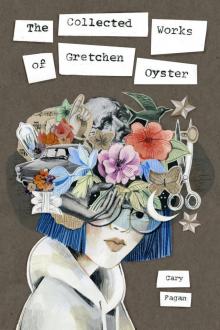 The Collected Works of Gretchen Oyster
The Collected Works of Gretchen Oyster Wolfie and Fly
Wolfie and Fly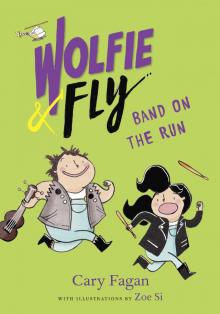 Band on the Run
Band on the Run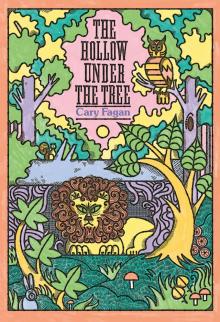 The Hollow under the Tree
The Hollow under the Tree Jacob Two-Two on the High Seas
Jacob Two-Two on the High Seas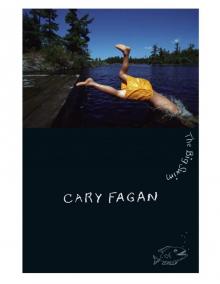 The Big Swim
The Big Swim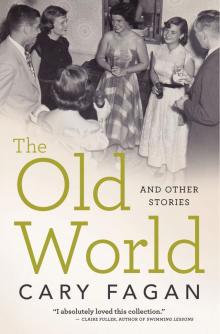 The Old World and Other Stories
The Old World and Other Stories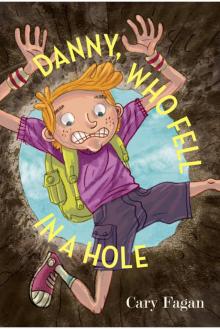 Danny, Who Fell in a Hole
Danny, Who Fell in a Hole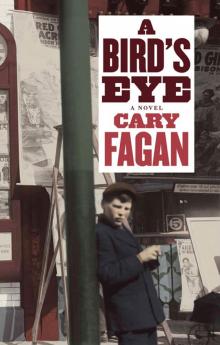 A Bird's Eye
A Bird's Eye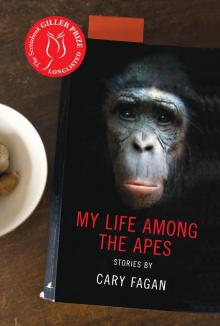 My Life Among the Apes
My Life Among the Apes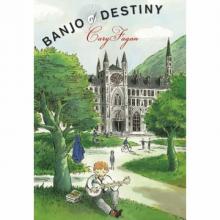 Banjo of Destiny
Banjo of Destiny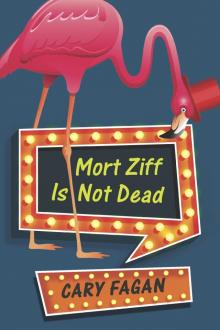 Mort Ziff Is Not Dead
Mort Ziff Is Not Dead